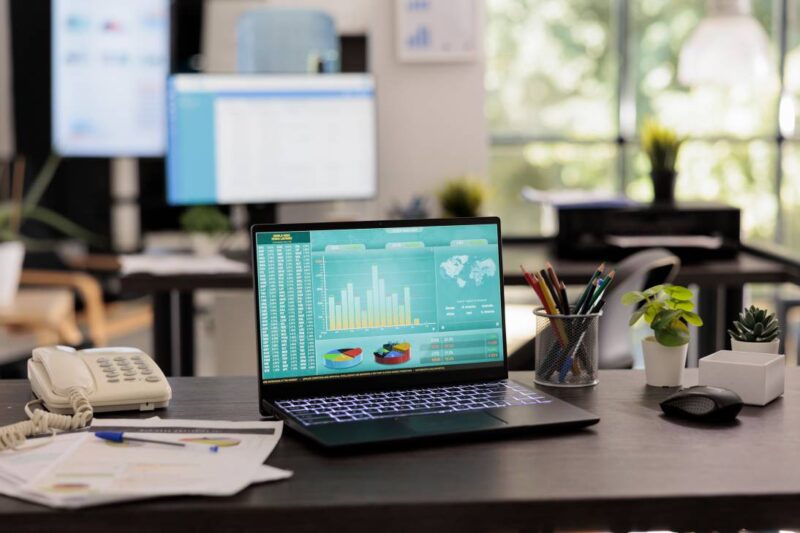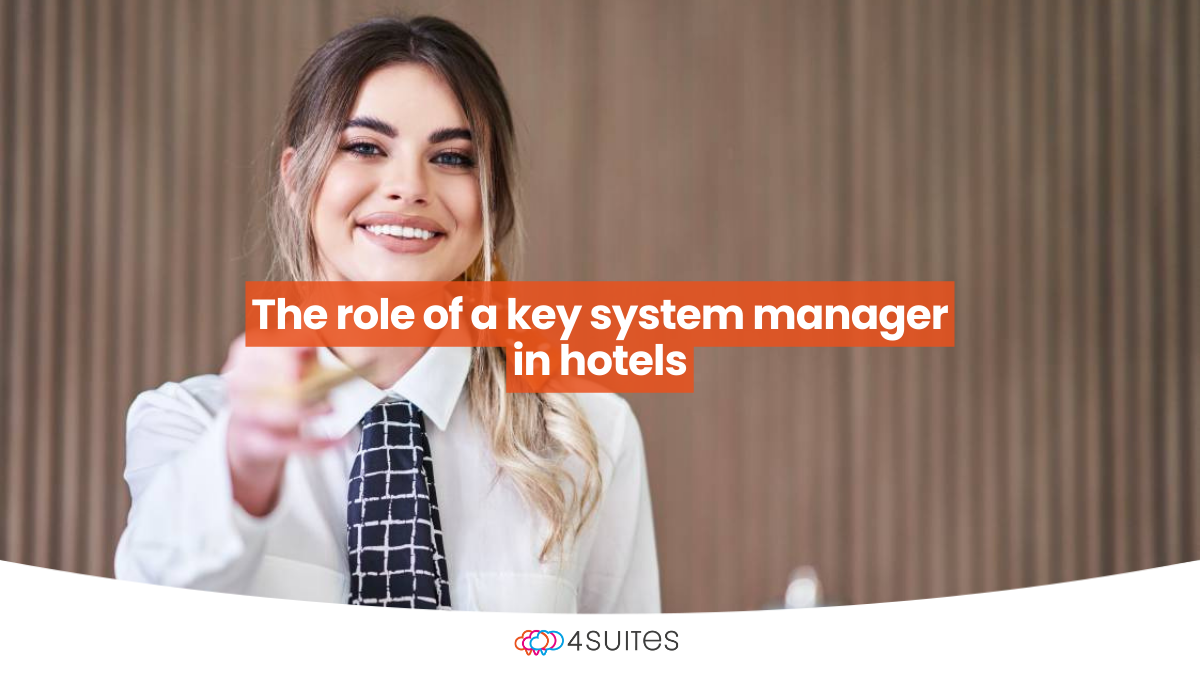With the rise of technology and the growing security concerns in the industry, a key system manager plays a vital role in managing the access control systems within the organization. By efficiently maintaining secure key access, this platform ensures that guests’ safety and security are under regulation at all times, while also contributing to the seamless operation of the establishment.
This article explores the significance and impact of this platform in unlocking success for hotels and similar establishments.
What is a Key System Manager?
A key system manager in the context of hotels typically refers to software or a platform that oversees and manages the electronic key system used for guest room access. This managerial tool controls and monitors the distribution, activation, deactivation, and overall administration of electronic keys, whether they’re traditional key cards or mobile keys accessed via smartphones.
![]()
Core Features of a Key Management System
The hotel industry is undergoing a technological revolution, with new trends and emerging technologies reshaping the way hotels operate. Here are some of the most prominent trends and innovations today:
1. Key Assignment
The key system manager serves as the central hub for assigning and activating keys for guest room access. During check-in, it efficiently allocates keys, whether they are traditional key cards or modern mobile keys accessed through designated apps. This system ensures a seamless and swift process for guests, enabling them to access their rooms promptly. The integration of mobile keys through apps not only enhances guest convenience but also aligns with evolving technological preferences, reducing reliance on physical key cards.
2. Security Management
Crucially, these systems prioritize security, incorporating robust encryption protocols and stringent security measures. They safeguard guest rooms against unauthorized access, ensuring the safety and privacy of guests’ belongings throughout their stay. The focus on security is integral, providing guests with peace of mind while maintaining the hotel’s commitment to safety.
“Establishing a clear and comprehensive key control policy serves as the foundation for effective key management. This policy should outline procedures for key issuance, tracking, duplication, and return.”
- Streamlining Hotel Operations by Keycafe.
3. Remote Control
A critical advantage of the automated key systems lies in their remote control capabilities. Staff can efficiently manage keys by remotely deactivating or activating them. This feature is particularly useful in scenarios involving lost devices or unexpected early checkouts, allowing swift responses to ensure security by instantly revoking access as needed.
4. Analytics and Reporting
These systems go beyond mere access control by providing valuable insights. They collect data on key usage, enabling hotels to understand guest behaviors and preferences. This information empowers hotel management to tailor services, personalize experiences, and continually enhance guest satisfaction. Moreover, the generated reports offer operational insights that aid in decision-making processes, contributing to improved efficiency and service quality.
5. Integration
Seamless integration with other hotel systems, such as Property Management Systems (PMS), booking engines, and mobile apps, is a cornerstone of the key system manager’s functionality. This integration enables smooth communication and encrypted data sharing, automating processes such as updating access privileges based on reservation statuses. It streamlines operations, enhancing overall efficiency and ensuring a cohesive guest experience across various touch points within the hotel.
Other Features of a Hotel Key System Management Platform
Here are the other features of a robust key system manager that hotel managers should consider:
- Compatibility and Scalability: A good key system manager should be adaptable and scalable to accommodate the evolving needs of the hotel. It should integrate with various hardware and software solutions and be capable of handling increased capacity as the hotel grows.
- User-Friendly Interface: An intuitive interface makes it easier for hotel staff to manage secure keys efficiently. Simple navigation, clear functionalities, and user-friendly features contribute to smoother operations.
- Mobile Accessibility: Given the trend toward mobile-centric solutions, the system should offer mobile accessibility for key management. This could include mobile apps for staff or guests to facilitate key assignments, activations, or deactivations.
- Audit Trails and Logs: Maintaining detailed logs and audit trails of key access and usage is critical for security and accountability purposes. This feature helps track who accessed which areas and when aiding in investigations or incident management.
- Customer Support and Training: Adequate customer support and training resources are vital for staff to maximize the system’s capabilities. Training sessions and responsive support services ensure smooth implementation and ongoing effective utilization.
These key features collectively enable a key system manager to effectively handle access control, enhance security, streamline operations, and contribute to an exceptional guest experience within a hotel setting.
“With key management software, you can improve and monitor the full key control workflow. That means managing alarms, analyzing reports, and granting personnel access to spaces all on one platform.”
- The Ultimate Guide to Key Control In The Workplace by Real Time Networks

How to Maintain a Key System Manager
Maintaining a key system manager is crucial to ensure its optimal functionality and security within a hotel setting. Here’s a comprehensive guide to maintaining a key system manager:
- Regular Updates and Patches: Stay current with software updates and patches provided by the system’s manufacturer. These updates often contain security enhancements, bug fixes, and improved functionalities. Implementing updates promptly helps in addressing vulnerabilities and keeping the system secure.
- Routine Inspections and Audits: Conduct regular inspections and audits of the key system manager. Check for physical wear and tear of key card readers, electronic locks, and other hardware components. Verify that access control settings are functioning correctly and conduct periodic security audits to ensure the system’s integrity.
- User Training and Education: Train staff members regularly on how to operate the key system manager effectively and securely. Ensure they understand best practices for issuing keys, handling lost keys, and responding to security incidents. Educated staff are crucial in maintaining the system’s security and operational efficiency.
- Access Control Reviews: Periodically review access control settings and user permissions within the system. Ensure that access privileges are aligned with current staff roles and responsibilities. Revise access levels promptly when staff roles change or when guests check out.
- Backup Procedures: Implement robust backup procedures for key system data. Regularly backup access logs, user permissions, and system configurations to prevent data loss in case of system failures or unexpected incidents. Store backups securely offsite or in the cloud.
- Physical Security Measures: Ensure the physical security of the key system manager components. Protect server rooms or cabinets housing the system hardware from unauthorized access. Regularly check and update physical security measures such as locks and access control in these areas.
- Vendor Support and Maintenance Contracts: Maintain a relationship with the system’s vendor or provider. Engage in vendor support and consider maintenance contracts to ensure access to technical assistance, upgrades, and prompt resolution of issues that may arise.
- Incident Response and Monitoring: Establish protocols for incident response and monitoring. Set up alerts for unusual access patterns or potential security breaches. Have a defined procedure for responding to security incidents, including protocols for revoking or reissuing keys as needed.
- Documentation and Record-Keeping: Maintain comprehensive documentation of the key system manager setup, configurations, and user manuals. Keep records of maintenance activities, updates, and any modifications made to the system for future reference.
- Regular Performance Evaluations: Periodically evaluate the performance of the key system manager. Solicit feedback from staff regarding system usability, efficiency, and any encountered issues. Use this feedback to address concerns and make improvements where necessary.
By implementing a proactive maintenance approach that encompasses software updates, hardware checks, staff training, and security measures, a hotel can ensure the continued reliability, security, and efficiency of its key system manager. Regular maintenance not only safeguards against security threats but also maximizes the system’s longevity and effectiveness.

Things to Look For in a Key Management Systems
Here’s a breakdown of what to look for when assessing a key system manager for a hotel:
- Security Features: The foremost consideration in a key system manager is its security capabilities. Look for robust encryption standards, multi-factor authentication, and stringent access controls. Some systems might allow you to implement your own encryption keys, but that is too complicated to execute. Ensure that the system adheres to industry best practices to prevent unauthorized access to guest rooms and sensitive areas within the hotel. Advanced security measures ensure the safety of guests’ belongings and their peace of mind during their stay.
- Integration Capabilities: Assess the system’s ability to integrate seamlessly with other hotel systems such as Property Management Systems, mobile apps, and booking engines. Compatibility ensures smooth data sharing, automated processes, and consistent guest access across various platforms. A well-integrated system streamlines operations and enhances the overall guest experience.
- Scalability and Adaptability: A key system manager should be adaptable to accommodate the hotel’s current needs and scalable enough to meet future expansions or technological advancements. Ensure that the system can flexibly handle changes in the number of rooms, evolving technology, and guest preferences. Scalability ensures the longevity of the investment and avoids the need for frequent system upgrades.
- Remote Management Capabilities: Evaluate the system’s ability to enable remote key management. This feature allows for immediate responses to security incidents, lost devices, or unexpected guest departures by enabling swift deactivation or activation of keys from a remote location. Remote management enhances security and operational efficiency.
- Reporting and Analytics: Comprehensive reporting and analytics functionalities are valuable for hotel management. The system should provide detailed insights into key usage patterns, guest behaviors, and operational metrics. These insights aid in making informed decisions, optimizing operations, and tailoring services to meet guest preferences.
- Reliability and Support Services: Assess the reliability of the system and the quality of support services provided by the vendor. Reliable customer support, regular system updates, and maintenance services are crucial for uninterrupted operations. A responsive support team ensures timely resolution of any issues that may arise.
- Cost-Effectiveness: Lastly, consider the overall cost of ownership, including initial installation, training, ongoing maintenance, and support. Balance the features and capabilities offered by the system with its total cost to ensure it aligns with the hotel’s budget and provides value for the investment.
Evaluating a key system manager based on these comprehensive criteria ensures that the chosen system not only prioritizes security and operational efficiency but also aligns with the unique needs and long-term goals of the hotel.
4SUITES: The Future of Key System Management in the Hospitality Industry
The role of a key system manager is crucial in unlocking success for hotels, resorts, and other establishments in the hospitality industry. By efficiently managing the keys and access control systems within the organization, they contribute to the safety, security, and operational efficiency of the establishment.
With 4SUITES, you can now further enhance the potential of everyday operations with intelligent access solutions, thereby offering a better guest experience to your customers.
4Suites’s unique cloud-based IoT access solutions include a fully automated system that can be easily integrated with your existing PMS or offers a seamless and intuitive service that you can install without hassles. This platform offers real-time insights and access management to your guests and staff so you can minimize check-in and check-out waiting times.
With mobile keys that require no app downloads, keycards that don’t store personal data, and cloud-connected locks, upgrades, and readers, our flexible solutions manage to suit every hotel’s needs. Book a demo today and explore how our solutions can help personalize and transform your guest experience.
Contact us today with further inquiries and we’ll be happy to get started!


